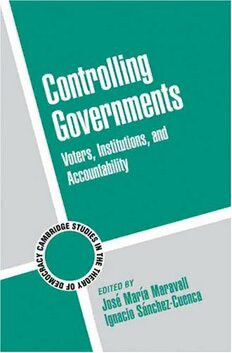
Controlling Governments: Voters, Institutions, and Accountability PDF
327 Pages·2007·1.257 MB·English
Most books are stored in the elastic cloud where traffic is expensive. For this reason, we have a limit on daily download.
Preview Controlling Governments: Voters, Institutions, and Accountability
Description:
This book contributes to debates in positive democratic theory about accountability and representation. It bridges the gap between formal models and theoretically weak empirical analyses. The chapters stay close to the results of the formal literature, but they provide a more realistic description of how the democratic control of governments operates. The book studies the many obstacles that citizens face to hold governments accountable: (1) voters combine judgments of past performance with other considerations - such as ideological or ethnic criteria; (2) parties in office may limit the information of voters; and (3) institutions bias the exercise of accountability.
See more
The list of books you might like
Most books are stored in the elastic cloud where traffic is expensive. For this reason, we have a limit on daily download.
